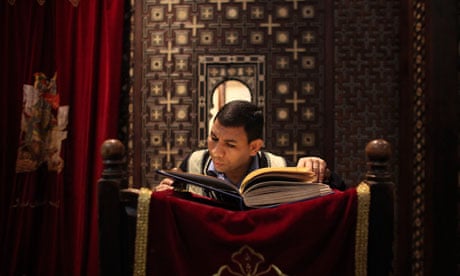Hopes that Arab Christians can enjoy full recognition in their countries' post-revolution politics appear to have suffered a setback. The political parties that have swept to power in Egypt and Tunisia are attempting to define their nations in narrow ethno-religious terms – as Islamic with sharia as the principal source of law. In Tunisia, for example, the constitution explicitly prohibits Christians from fielding candidates in the presidential election.
Attacks against Coptic churches and Christians in Egypt have increased during and since the revolution, and Arab Christians have allegedly been attacked in Syria. This has led to much soul-searching in the Arab Christian community, whose numbers and political influence have dwindled significantly over the past two decades owing to significant bouts of emigration.
The fact that the new political parties have been elected with significant majorities certainly complicates matters for minority groups – including Arab Christians – as their rights and aspirations could easily be ignored by the majority.
Nevertheless, the fragile state of the Egyptian and Tunisian economies represents an opening for minority groups.
First, the difficulty of governing in such a challenging environment may encourage the new ruling parties to reach out to minorities in order to forge a broad-based domestic coalition for their economic and social reform programmes.
Second, economic difficulties make overseas aid and foreign direct investment a valuable commodity – and calls for foreign aid to be linked to progress on human rights may further strengthen the position of minorities.
That said, though, foreign support for minorities is not guaranteed. Some Christian leaders, including Father Rifat Bader of the Catholic Centre for Media Studies in Jordan, worry that the west will prioritise strategic interests and stability over the promotion of values.
It would therefore be a strategic mistake for Arab Christians to rely on foreign governments. Rather, they should reach out to the new ruling elites by identifying areas of common interest and pressing for guarantees on minority rights in exchange for political support.
One important test will come during negotiations over the new Egyptian constitution, where Arab Christians are pressing for the right to maintain their own religious laws. In that respect, they have some support from secular and socialist groups and activists. Arab Christians might also be able to broaden their domestic support by emphasising civic rights in general rather than focusing exclusively on their own sectarian interests.
While the future of Syria remains unclear, Arab Christians who have historically aligned themselves with the ruling Assad elite in exchange for certain rights and privileges should begin to develop alliances with opposition groups to identify areas of common interest and concern – as well as working with other civil society elements and the business community.
The situation in Jordan is even more uncertain as the momentum for reform seems to have stalled. Arab Christians make up approximately 6% of Jordan's population and – as in Syria – have historically aligned themselves with the ruling elite. While this has afforded them certain political rights, including the right to vote and field candidates in parliamentary elections, they have been prevented from holding the office of the prime minister under the constitution.
Jordanian Christians – much like Palestinian-Jordanians who make up approximately 70% of the kingdom's population – are also largely underrepresented in the cabinet and in the security-military apparatus. Looking ahead to any future reform in Jordan, the Arab Christians should consider distancing themselves from the Hashemite regime by building alliances and reaching out to Palestinian-Jordanians as internal and international pressure to democratise continues.
While the Arab spring has certainly unleashed democratic forces in the Middle East, including free and fair elections, it has yet to create fully fledged democracies. Arab Christians have a tough task ahead in navigating the rough new political terrain but they must work hard to cultivate new alliances with emerging ethnic and religious elites to ensure that their rights and identities are adequately bulwarked as a matter of law – but also as a matter of practice.
